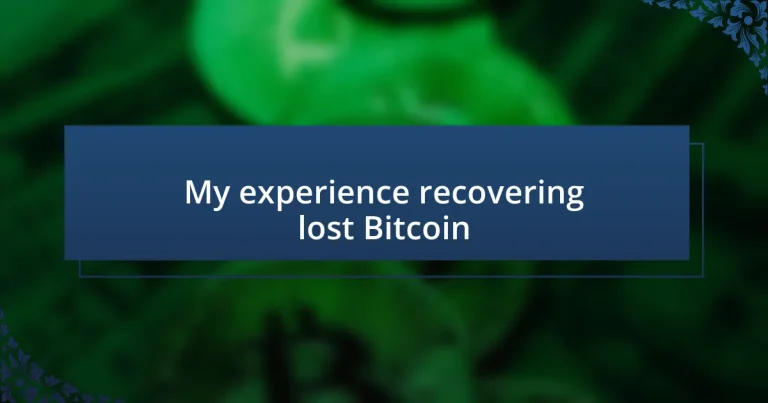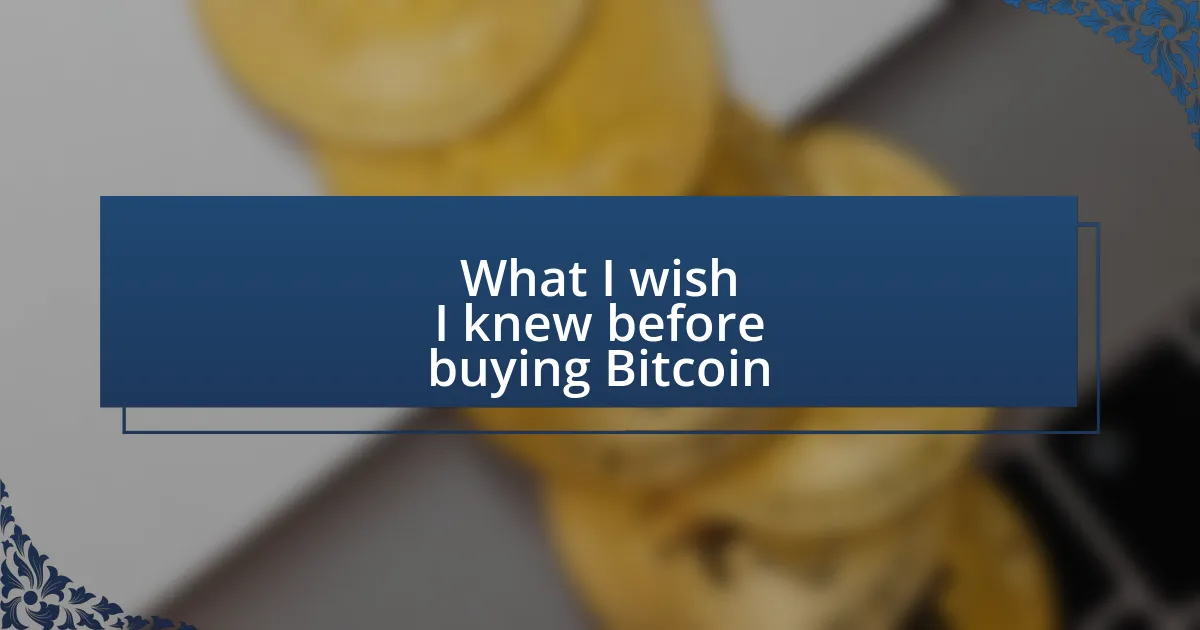Key takeaways:
- The realization and emotional impact of losing Bitcoin due to wallet compromise prompted a journey of recovery and learning about security.
- Structured recovery steps include identifying wallet type, searching for private keys, and utilizing recovery phrases to regain access.
- Engaging with the community and using various recovery tools can greatly enhance the chance of successfully recovering lost Bitcoin.
- Implementing robust security measures and regularly updating software are crucial to prevent future Bitcoin loss.
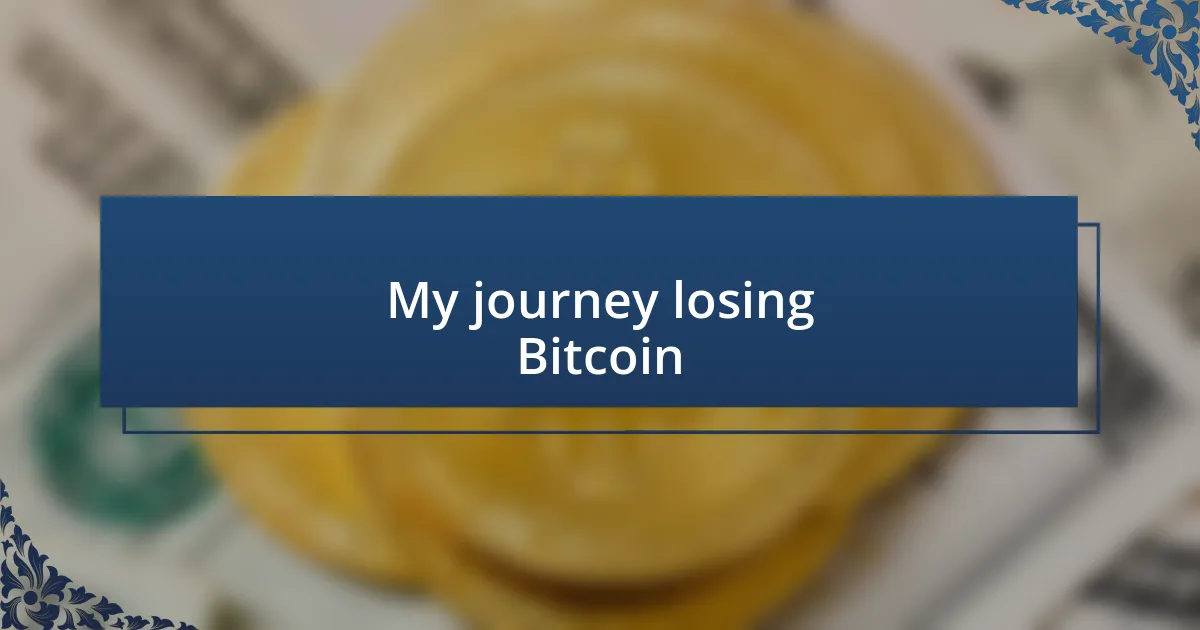
My journey losing Bitcoin
Losing my Bitcoin was a surreal experience, almost like watching a slow-motion train wreck. One moment, I was riding high, feeling invincible, and the next, my heart sank as I realized my wallet had been compromised. I still remember the sinking feeling of confusion turning into panic as I frantically searched for a solution.
The worst part was the uncertainty. I constantly questioned myself — what could I have done differently? I replayed the events over and over in my head. I felt a mix of anger and disbelief; the possibilities of what that lost Bitcoin could have meant for my future were slipping away. It was more than just an investment, it felt like a part of my journey had been erased in an instant.
As I ventured deeper into recovery attempts, I encountered the harsh reality of how vulnerable we can be in the cryptocurrency space. I had to grapple with the emotional weight of loss, but that experience ignited a determination in me. How could I better secure my assets moving forward? This question drove me to learn as much as I could about safeguarding my investments and helped me emerge stronger, albeit a little wiser and more cautious.
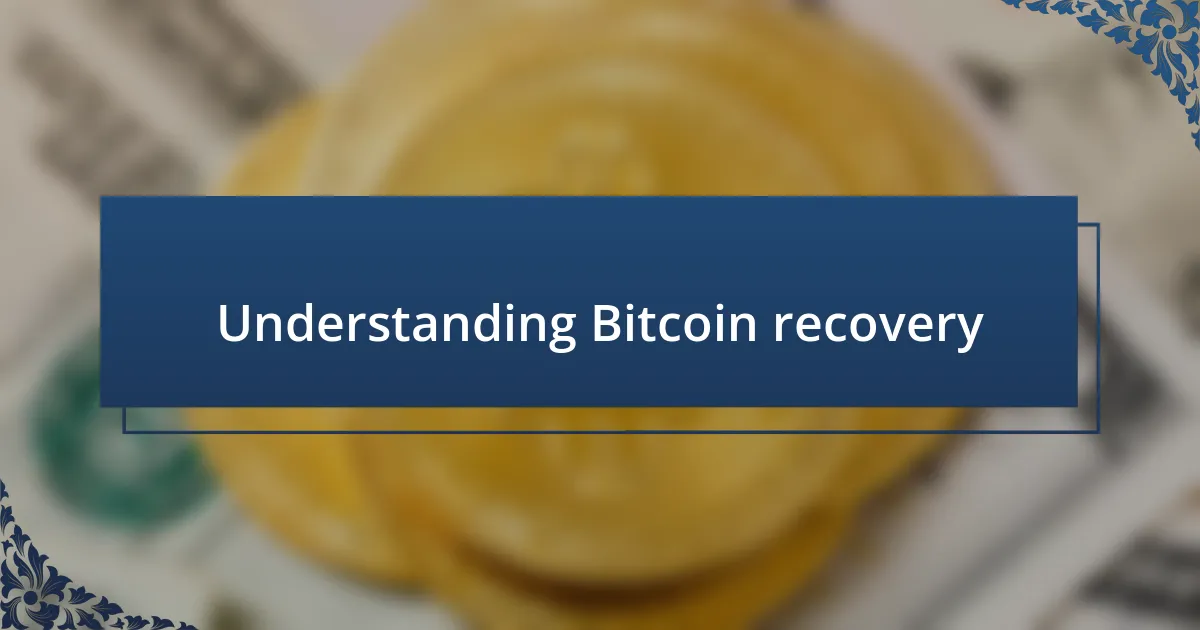
Understanding Bitcoin recovery
Understanding Bitcoin recovery is a crucial step for anyone who has faced a similar situation. When I began my recovery journey, I quickly realized that due diligence is essential. Exploring various recovery methods showed me the stark differences in effectiveness; it wasn’t just about regaining access but also understanding how to prevent future losses.
The emotional rollercoaster was palpable. As I read stories of others who successfully navigated their recoveries, I felt both hopeful and anxious. Some utilized recovery services that promised high success rates, while others relied on their investigative skills to track their lost coins. This wide array of approaches made me appreciate the nuances of Bitcoin recovery and how personalized each experience can be.
Reflecting on my experience, I learned that every lost Bitcoin offers a lesson. Whether through careful analysis of wallets, understanding private keys, or the importance of backup strategies, recovering Bitcoin is as much about the journey of learning as it is about the destination of regaining funds. Each attempt taught me invaluable insights into the technical and emotional aspects of the cryptocurrency world.
| Method | Description |
|---|---|
| Professional Recovery Services | Involves hiring experts who specialize in cryptocurrency recovery. |
| Self-Investigation | Utilizing personal knowledge and online resources to track lost coins. |
| Community Support | Engaging with forums and social media groups for shared experiences. |
| Backup Strategies | Implementing methods to secure and back up wallets to prevent future losses. |
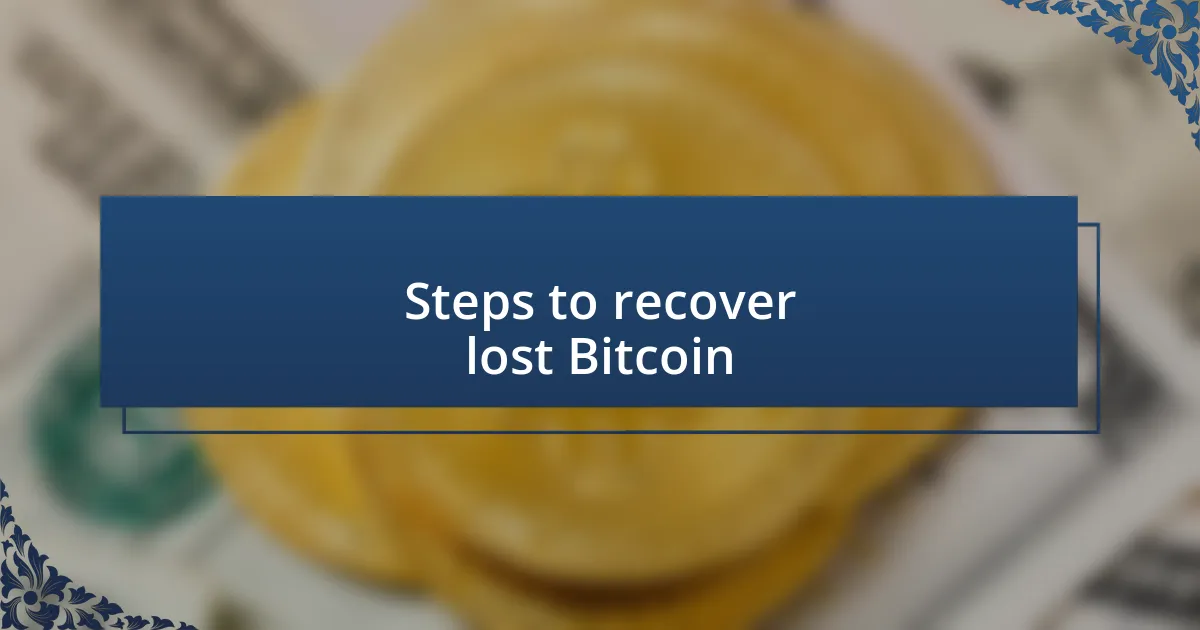
Steps to recover lost Bitcoin
Taking the right steps to recover lost Bitcoin can feel daunting, but I’ve found clarity in a structured approach. Initially, I focused on locating my private keys, which are like the keys to a digital vault. This moment was nerve-wracking, thankfully, retracing my digital footprints led me to the right storage method.
Here’s a list of steps that can help guide you through the recovery process:
- Identify Wallet Type: Determine whether you used a hardware wallet, software wallet, or an exchange to store your Bitcoin.
- Search for Private Keys: Look for any backup locations, such as password managers or written notes where you might have saved your keys.
- Utilize Recovery Phrases: If you opted for a wallet that provides recovery phrases, find that 12, 18, or 24-word phrase to restore access.
- Check Associated Emails: Explore your email accounts for any communication from exchanges or wallet services that could assist in recovery.
- Reach Out for Help: When in doubt, don’t hesitate to connect with support services or online communities who can offer shared experiences.
Every step brought a mix of hope and frustration. After contacting a recovery service and sharing my story, I found that empathy and support helped me stay grounded during the uncertainty. Each tiny victory in this process felt like a personal triumph, transforming the anxiety of loss into determination for recovery.
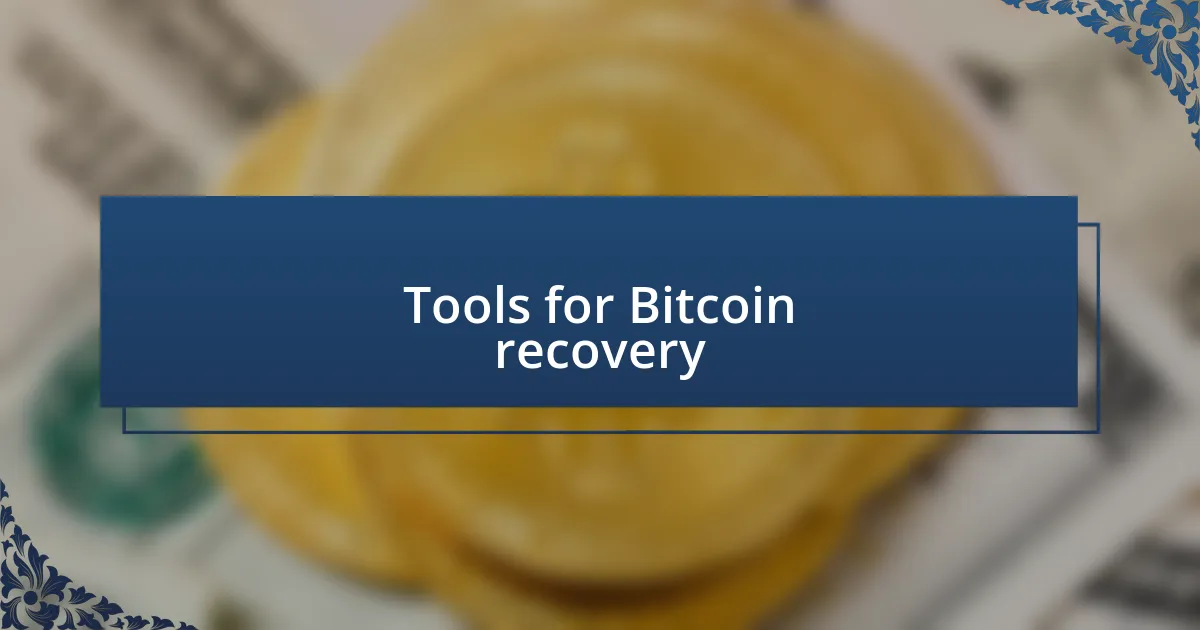
Tools for Bitcoin recovery
When it comes to tools for Bitcoin recovery, I’ve found that certain software can really make a difference. For instance, utilizing wallet recovery tools like restore wallets can help you access your Bitcoin if you have the right recovery phrase. I remember the moment I realized I could use such a tool; it felt like a glimmer of hope amidst the frustration.
Another vital resource is the community forums and support groups. There have been times when I was stumped, and a simple question in a Bitcoin community led me to life-saving advice on recovery strategies. It’s curious how sharing experiences not only helps in troubleshooting but also fosters a sense of solidarity among those of us facing similar challenges.
Moreover, exploring hardware wallet recovery options can often yield surprising results. I experimented with a recovery tool for my Ledger wallet, which guided me step-by-step through regaining access. Reflecting on that experience, I can’t stress enough how essential it is to familiarize yourself with these tools ahead of time; preparation can save you from a potential emotional rollercoaster later on.
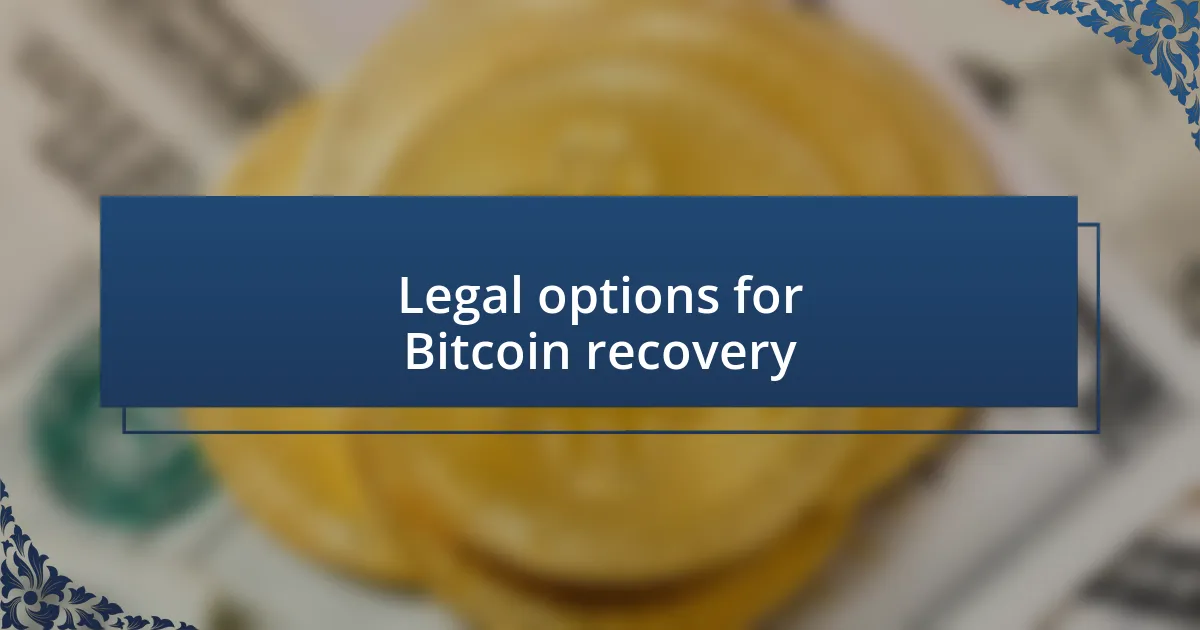
Legal options for Bitcoin recovery
When I faced the daunting task of recovering my lost Bitcoin, I realized that understanding the legal landscape was crucial. Legal options can be a confusing maze, but consulting with a lawyer who specializes in cryptocurrency can illuminate the path forward. I remember feeling overwhelmed by the technical jargon, but having someone knowledgeable by my side made the whole process much clearer.
In some cases, if you believe your Bitcoin was stolen or fraudulently obtained, filing a police report can be a necessary step. It’s not just about documenting the loss; it establishes a legal basis for any further actions you might take. I still recall the frustrating hour I spent detailing my situation to the officer, but it was necessary to take that formal step toward retrieval.
Another avenue worth exploring is civil litigation, especially if you know the individual or entity responsible for your loss. While the thought of going to court can be daunting, I found that having a clear legal strategy empowers you to act decisively. After all, isn’t it better to fight for what’s yours than to just let it go?
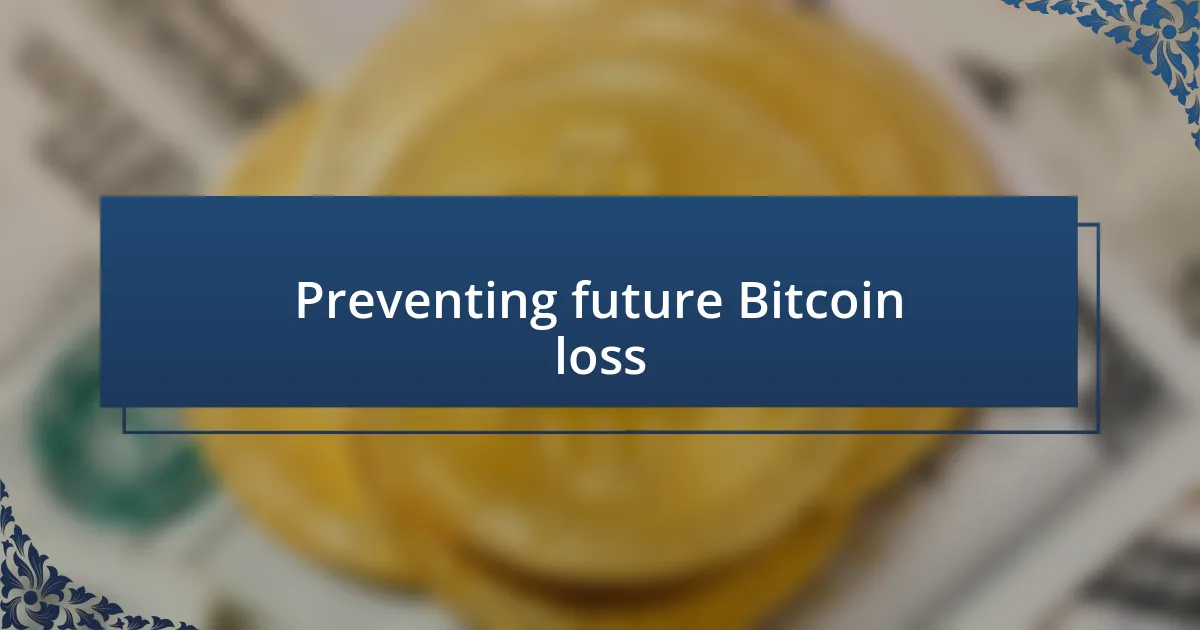
Preventing future Bitcoin loss
To prevent future Bitcoin loss, I’ve learned that implementing robust security measures is non-negotiable. I invested in a hardware wallet, which not only stores my Bitcoin offline but also adds a layer of protection against hacking attempts. Have you ever felt that sinking anxiety when your digital assets are at risk? I certainly have, and using secure wallets has helped alleviate that fear.
Regularly updating your software is another critical step I’ve taken. One time, I neglected an update and faced a minor scare when I encountered a strange notification on my exchange account. It turns out that keeping software current shields you from vulnerabilities that could be exploited by malicious actors. I now make it a point to check for updates every month, treating it like a personal ritual to safeguard my investments.
Educating myself about phishing attempts has been a game-changer. I remember nearly falling for a convincing email that promised urgent account verification; thankfully, I paused to double-check. By familiarizing myself with common scams, I feel more empowered to recognize red flags before they can affect my crypto holdings. Do you actively stay informed about potential threats? Trust me, it’s an investment in your peace of mind.
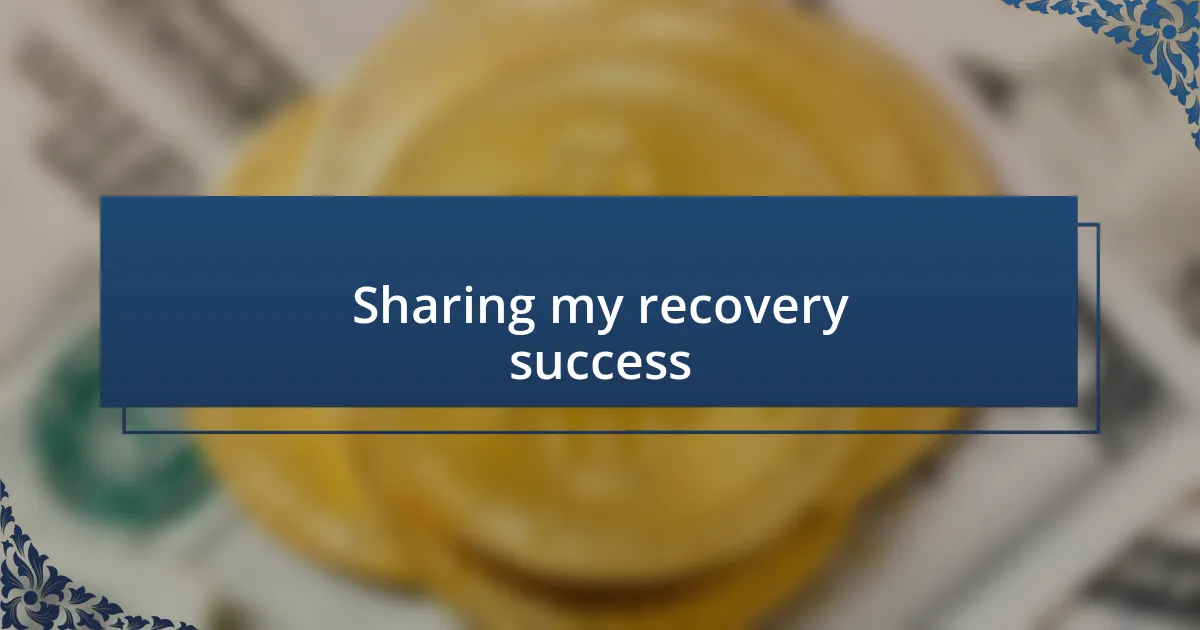
Sharing my recovery success
When it comes to sharing my recovery success, I can’t help but remember the overwhelming rush of emotions I felt the moment I reclaimed my lost Bitcoin. After months of scouring exchanges and digging through wallet backups, I finally stumbled upon an old 12-word recovery phrase tucked away in a forgotten app on my phone. Have you ever experienced a wave of relief so intense it makes your heart race? That was me, riding the high of discovery, feeling like I’d found buried treasure.
The process of tracing my steps was both daunting and enlightening. I meticulously documented every attempt I made, which created a sort of roadmap to recovery. In the end, each twist and turn in that journey not only strengthened my resolve but also deepened my understanding of digital asset management. I often wonder how many others might find value in sharing their experiences – wouldn’t it be amazing if we could learn collectively from these challenges?
I also found significance in the connections I made during this ordeal. I reached out to online forums and communities, where I shared my story and sought advice. Surprisingly, many resonated with my struggle and offered invaluable tips that ultimately shaped my success. Have you ever felt the weight lift when you discover you’re not alone in your challenges? That support truly transformed my experience, leading me to realize that recovery isn’t just about reclaiming assets; it’s about building a community of knowledge and resilience.

